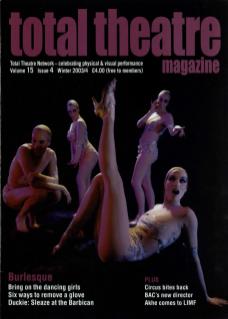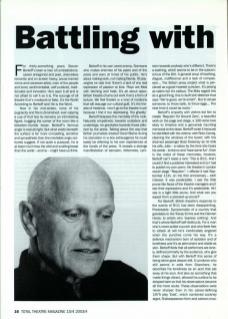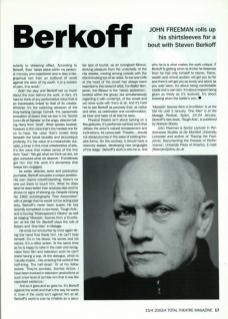For thirty-something years Steven Berkoff's been a man of contradictions: career antagonist and poet, shameless romantic and on-screen heavy, Lecoq-trained mime and voiceover artist, man of the people and loner, sentimentalist, self-publicist, traditionalist and innovator. He's seen it all and is not afraid to call it as it is. The scourge of all theatre that's mediocre or fake. It's the World According to Berkoff and He is the Word.
Now in his mid-sixties, none of his pugnacity and fire is diminished: even sipping a cup of fruit tea he remains an intimidating figure, hugging the corner of the room like a between-rounds boxer. Berkoff's famous anger is real all right. But what exists beneath the surface is far more compelling, sensitive and sympathetic than the inevitable angry outbursts suggest. If not quite a pussycat, he is at least much less the wild and snarling beast than the world – and he – might have us think.
Berkoff is his own worst enemy. Someone who makes enemies of his peers and of the press and even at times of his public. He's about making work, not making friends. Of playwrights he rails that ‘there's a lack of any real expression of passion or love. Plays are filled with bitching and hate. It's all about spew. British theatre churns out work that's a form of torture. We feel theatre is a kind of medicine that will assuage our cultural guilt. It's the theatre of medicine. I don't go to the theatre much because I find it too depressing. Too ghastly.’
Berkoff despises the mentality of the mob. Naturally empathetic towards outsiders and underdogs, he gravitates towards those pilloried by the press. Talking about the way that British journalists treated David Blaine during his starvation-in-a-box extravaganza he could easily be referring to his own experiences at the hands of the press. 'It reveals a strange manifestation of sarcasm, bitterness, cynicism towards anybody who's different. There's a loathing, which seems to be in the subconscious of the Brit. A general soup of loathing, disgust, indifference and a lack of compassion... The British press project what is perceived as a good-hearted cynicism. It's posing as satiric but it's callous. The Brits regard this as a good thing, this in-built shit-detector that says "We're good, we're smart". But to abuse someone, to throw balls, to throw eggs... The next time it could be rocks.’
Berkoff's empathy with victims led him to create Requiem for Ground Zero, a beautiful work on the page and stage, a 100-verse love story to America and a genuinely haunting memorial to the dead. Berkoff wrote it because he identified with the victims: with Roko Camaj cleaning the windows of the tower, with the doomed passenger Brad Sweeney as he tells his wife, Julie – a widow by the time she hears his words – to ‘live on and have some fun'. Even in the midst of these memories, however, Berkoff can't resist a rant: ‘This is 9/11. And I couldn't find a publisher interested and so I had to publish my own poem. No theatre in London would stage Requiem. I offered it last September 11th, on the first anniversary... zilch interest. It was predictable. I see the little prune-like faces of the theatre managers and I see their expressions and it's predictable. All I see is a tight little prune. And what can you expect from a screwed-up prune?'
For Berkoff, British theatre's response to the events of 9/11 has been disappointing. Predictable. Symptomatic of a country that gravitates to the Tracey Emins and the Damien Hirsts; to artists who 'express nothing’. And that's where Berkoff self-destructs. For a man who's never pulled a punch and who feels free to attack at will he's inordinately angered when the punches come his way. It's a defence mechanism born of isolation and of loneliness and it's as permanent and visible as skin. Berkoff feels that all performers are lonely, defined primarily by the audience, who give them shape. But with Berkoff this sense of being alone goes deeper still. A Londoner who still seems in exile from Elsewhere, he describes his loneliness as an acid that ate away at his soul. And also as something that made things vibrant, allowed his surface to be stripped bare so that his observations became all the more acute. These observations were never sharper than in his career-defining 1975 play East, which combined cockney argot, Shakespearean form and cartoon muscularity to blistering effect. According to Berkoff, East ‘takes place within my personal memory and experience and is less a biographical text than an outburst of revolt against the sloth of my youth. It is a scream of pain. It is revolt.'
Both the play and Berkoff tell us much about the man behind the work. In fact, it's hard to think of any performative voice that is so inextricably linked to that of its creator. Whether it's the twitching abrasion of the Kray-baiting George Cornell, the passionate evocation of desire that we see in his Secret Love Life of Ophelia or the angry, director-hating Harry from Graft. What speaks loudest, however, is the voice that's the hardest one for us to hear, the voice that's buried deep beneath the lyrical brutality and picturesque profanity. It's the voice of a melancholic outsider, a loner in this most collaborative of arts, it's the voice that makes sense of the line from East: 'We get what we think we are, we give ourselves what we deserve.' If loneliness got him into this work it's aloneness that keeps him engaged.
As writer, director, actor and production journalist, Berkoff occupies a unique position. His own claims notwithstanding, there's no one out there to touch him. What he does best he does better than anybody else and he shows no signs of slowing up. Despite closing his 1992 autobiography Free Association with a pledge that he would not be acting past sixty, Berkoff's never been busier. He has recently completed a new book, Tough Acts, and is touring Shakespeare's Villains as well as staging Messiah: Scenes from a Crucifixion at the Old Vic (Berkoff plays the role of Satan) and One Man in Malaga.
He ends our encounter by once again biting the hand that feeds him. He can't help himself. It's in his blood, his bones and his nature. It's a reflex action. At the same time as he is happy to rake in the cash and recognition from film and television work he can't resist having a pop. At the dialogue, which is 'usually insipid... like entering the world of the half-living. The half-dead.' Or at his fellow actors: 'They're zombies. Zombie Actors. I have been involved in television productions at such a low level of zombie-ism that it was like vaporised existence.'
And so it goes and so goes he. It's Berkoff against the world and that's the way he wants it. Even if the world isn't against him at all. Berkoff's world is one he inhabits as a peculiar type of tourist, as an energised flâneur, deriving pleasure from the underbelly of the city streets, moving among crowds with the discriminating eye of an artist. To live one's life at the heart of the crowd has always been essential to this breed of artist. For Walter Benjamin, the flâneur is the 'heroic pedestrian located within the group, but simultaneously regarding it with contempt, of the crowd and yet never quite with them at all’. And it's hard not to see Berkoff as precisely that: as native and other, as celebration and condemnation, as lover and hater of all that he sees.
Physical theatre isn't about tacking on a few gestures. It's performer-centred work that utilises the actor's natural temperament and inclinations. As Lecoq said: ‘Theatre... should not always journey in the wake of existing theatre forms. On the contrary, it should have a visionary aspect, developing new languages of the stage.' Berkoff's work is who he is. And who he is is what makes the work unique. If Berkoff is getting what he thinks he deserves then he has only himself to blame. Fame, wealth and critical acclaim will get you so far and then it will get you as lonely and alone as you ever were. It's about being comfortable inside one's own skin. It's about respect being given as freely as it's received. It's about knowing when the battle's won.
Messiah: Scenes from a Crucifixion is at the Old Vic until 3 January. One Man is at the Malaga Festival, Spain, 23-24 January. Berkoff's new book, Tough Acts, is published by Robson Books.
John Freeman is Senior Lecturer in Performance Studies at De Montfort University, Leicester and author of Tracing the Footprints: Documenting the Process of Performance, University Press of America. E-mail: jfreeman@dmu.ac.uk


